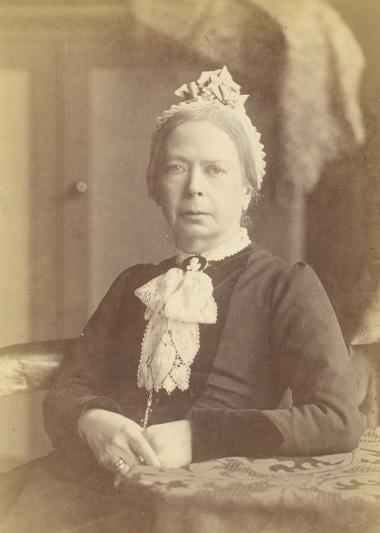As an educator and suffragist, Frances Buss dedicated her life to a vision of equality.
It was a life that began with severe disadvantage. Born in London in 1827, Buss was the daughter of Frances Fleetwood and Robert Buss, a talented but unsuccessful artist. She was the eldest of ten children, five of whom died in infancy. The family was incredibly poor, and after a few years she was sent to live with her grandparents.
Buss soon found herself placed at a public school, later reflecting that her grandparents probably sent her there “to get me out of the way”. In the learning environment, she thrived, and by the age of fourteen was teaching students, some of whom were even older than herself.
When Buss turned 18, her mother opened a small private school in order to support the family. Buss taught at the school, while later taking night classes at the newly-opened Queen’s College. In 1949, she received qualifications in French, German, and Geography.
Inspired by her studies, Buss went on to found her own school, The North London Collegiate School for Ladies, the following year. She took on the role of headmistress, becoming the first to ever use the title. Wanting to ensure a high quality of education, Buss only hired qualified professionals to teach, including her father and brother.
The school soon gained a reputation as a model of educative excellence. Visitors came from around the country to inspect the facility, including Emily Davies, who would go on to convince the authorities to allow women to study at London University. The two became close friends, and launched a campaign to allow the women the right of equal education. The campaign sent shockwaves through London, and resulted in a 1864 enquiry into gender equality in the schooling system. Buss testified as part of the commission, but her insistence that more secondary schools allow young women to enrol went mostly ignored. It would be 100 years before the majority of British high schools were reformed as co-educational. Though colleges were more accepting of women, allowing them to study from the 1870s, many only offered courses that did not lead to degrees.
In 1865, Buss, Davies, and several other women founded the Kensington Society, a group focused on the discussion of women’s issues. The group included 33 women as of official founding, all of whom came from varied backgrounds but, nonetheless, shared a singular vision: the advancement of women under a patriarchal society. They petitioned the government to give women equal political rights, and though a bill was brought to the floor, it was defeated. Nevertheless, the society played a crucial part in ultimately seeing women receive the right to vote in the early 20th century.
The College of Preceptors elected Buss as a Fellow in 1869. It was her first, and only, public recognition of Buss’s achievements during her lifetime.
The following year, she handed The North London Collegiate School to trustees, transforming it into a public school. Though it resulted in a loss of profit, the move allowed more young women access to education. Buss also founded the Camden School for Girls in 1871 for this same purpose.
Over the next decade and a half, Buss was instrumental in the founding of The Association of Head Mistresses – where she held the position of president until 1894 – along with the Teacher’s Guild and Cambridge Training College for teachers.
In 1890, Buss began to suffer from a debilitating kidney disease, but it did not slow her down. She continued to run The North London Collegiate School until her death on December 24, 1894.
Buss’s influence on the changing landscape of education for women has now mostly been forgotten, but this is simply because it was so profound. What we now take for granted – co-education, the right to vote, or to attend university – are the direct results of Buss’s tireless pursuit for equality.

